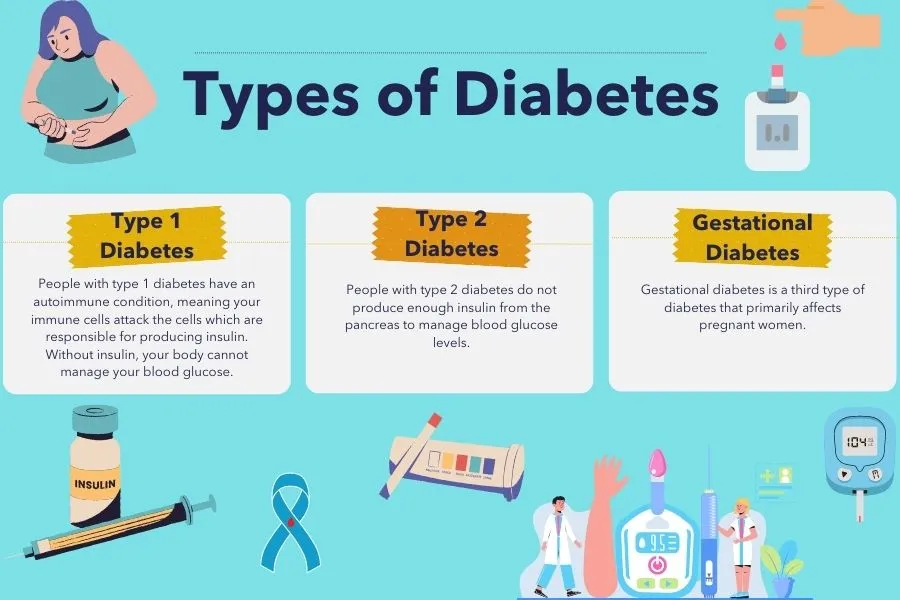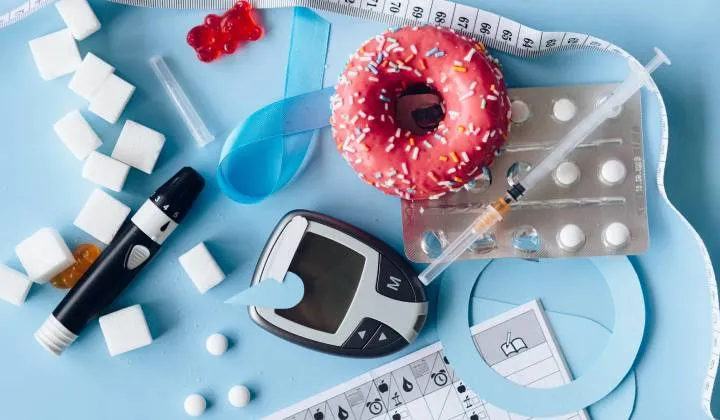Diabetes is a chronic metabolic disorder that affects millions of people worldwide. It occurs when the body is unable to properly regulate blood sugar levels, leading to various health complications. Understanding the different types of diabetes is crucial for effective diabetes management and maintaining overall well-being. In this blog, we will delve into the three main types of diabetes – Type 1, Type 2, and Gestational Diabetes – and explore the importance of using sugar test machines and blood sugar test kits, such as Beato glucometer strips, in diabetes management.

Type of Diabetes

- Type 1 Diabetes: An Autoimmune Condition
Type 1 diabetes, also known as juvenile diabetes or insulin-dependent diabetes, is an autoimmune condition where the immune system attacks and destroys the insulin-producing beta cells in the pancreas. As a result, the body cannot produce insulin, a hormone necessary for glucose to enter the cells and provide energy. Individuals with Type 1 diabetes require insulin injections to manage their blood sugar levels effectively. Regular use of sugar test machines and blood sugar test kits is vital for monitoring glucose levels and adjusting insulin doses accordingly.
- Type 2 Diabetes: Lifestyle and Genetics
Type 2 diabetes is the most common form of diabetes and is often associated with lifestyle factors, such as poor diet, sedentary habits, and obesity. It can also have a genetic component. In Type 2 diabetes, the body either resists the effects of insulin or doesn’t produce enough insulin to maintain normal blood sugar levels. Initially, lifestyle changes, such as a healthy diet, regular exercise, and weight management, may be sufficient to manage Type 2 diabetes. However, some individuals may eventually require oral medications or insulin therapy. Regular monitoring using sugar test machines and glucometers is essential to keep glucose levels in check and prevent complications.
- Gestational Diabetes: Occurring During Pregnancy
Gestational diabetes develops during pregnancy when hormonal changes can affect insulin sensitivity. It usually occurs in the second or third trimester and typically resolves after childbirth. However, women who experience gestational diabetes have an increased risk of developing Type 2 diabetes later in life. Monitoring blood sugar levels using sugar test machines and blood sugar test kits becomes crucial during pregnancy to ensure the well-being of both the mother and the baby. Lifestyle modifications, such as a healthy diet and regular exercise, are often recommended, and in some cases, insulin therapy may be necessary.
Also Read: 7 Amazing Makhana Benefits We Bet You Didn’t Know About
Importance of Diabetes Management
Diabetes management plays a pivotal role in preventing complications associated with high blood sugar levels. Proper management includes:
Regular Monitoring: Sugar test machines and blood sugar test kits, like BeatO glucometer strips, provide a convenient and efficient way to monitor blood glucose levels at home. Regular monitoring helps individuals make informed decisions about diet, exercise, and medication, leading to better diabetes control.
Healthy Lifestyle: Adopting a healthy lifestyle is essential for all types of diabetes. A balanced diet, regular physical activity, and stress management can significantly improve blood sugar levels and overall well-being.
Medication Adherence: For those with Type 1 or advanced Type 2 diabetes, adhering to prescribed medications and insulin therapy is crucial for maintaining stable blood sugar levels.

Regular Medical Check-ups: Routine visits to healthcare professionals allow for comprehensive diabetes management, early detection of potential complications, and adjustments to treatment plans as needed.
Factors to Keep in Mind When Designing a Diabetes-Friendly Diet
For diabetes management, several dietary approaches can be effective in helping to control blood sugar levels and improve overall health. The recommended diets for diabetes include:
Mediterranean Diet: This diet emphasizes fruits, vegetables, whole grains, legumes, nuts, seeds, and healthy fats like olive oil. It includes moderate consumption of fish and poultry and a limited intake of red meat. The Mediterranean diet is rich in fiber and has been associated with better blood sugar control and reduced cardiovascular risk.
DASH Diet (Dietary Approaches to Stop Hypertension): Originally designed to lower blood pressure, the DASH diet is also beneficial for diabetes management. It encourages consuming foods low in saturated fat, cholesterol, and sodium while promoting the intake of fruits, vegetables, whole grains, lean proteins, and dairy products.
Plant-Based Diet: A plant-based diet focuses on plant-derived foods like fruits, vegetables, whole grains, legumes, nuts, and seeds while minimizing or eliminating animal products. It has been shown to improve insulin sensitivity, reduce the risk of cardiovascular disease, and help with weight management.
Low-Carbohydrate Diet: This diet restricts the intake of carbohydrates, particularly refined carbohydrates and sugars. It encourages higher consumption of protein and healthy fats. Low-carb diets can help lower blood sugar levels and reduce the need for diabetes medication in some individuals.
Carbohydrate Counting: This approach involves monitoring and managing carbohydrate intake with the aim of maintaining stable blood sugar levels. It can be customized to individual needs and is commonly used by people with type 1 diabetes, those on insulin therapy, or those who prefer a flexible approach.
Glycemic Index (GI) Diet: The GI ranks foods based on their impact on blood sugar levels. Low-GI foods, which are slower to raise blood sugar, are favoured in this diet. High-GI foods are limited or consumed with low-GI foods to reduce overall blood sugar spikes.
Dietary Supplements: Some studies suggest that certain supplements like cinnamon, chromium, alpha-lipoic acid, and magnesium may help improve insulin sensitivity or lower blood sugar levels. However, it’s essential to consult with a healthcare professional before taking any supplements, as individual needs may vary.
Regardless of the specific diet chosen, it is crucial for individuals with diabetes to work with a registered dietitian or healthcare professional to create a personalized meal plan that aligns with their health goals, lifestyle, and diabetes management needs. Regular monitoring of blood sugar levels and maintaining a healthy weight through a balanced diet and regular physical activity are essential components of effective diabetes management.
Read More: Dragon Fruit Benefits, Nutritional Facts, And More
Conclusion
Diabetes is a complex and prevalent condition that requires proper understanding and continuous blood sugar level management. By exploring the different types of diabetes – Type 1, Type 2, and Gestational Diabetes – individuals can take proactive steps towards effective diabetes management. Regular monitoring using sugar test machines and blood sugar test kits, like Beato glucometer strips, empowers individuals to stay in control of their health and make informed decisions to lead a fulfilling life despite diabetes. Always consult healthcare professionals for personalized advice and support on diabetes management. With the right approach, diabetes can be effectively managed, allowing individuals to embrace life to the fullest.
Disclaimer :
It is crucial to monitor your blood sugar levels using a smartphone-connected glucometer on a regular basis. If you feel doubtful about whether or not you should consume a particular item, you should do a quick sugar check before and after you consume it.
Being a person with diabetes, you can enjoy your favourite treats by making sure that you keep the portion size in check. Overindulging can lead to a spike in your sugar levels. It’s important to discuss with your physician how a food item can affect your blood glucose levels. If you have any doubts about what you can include as a part of your diabetes diet, you should always speak to your doctor or health coach.
Consult BeatO’s health coach for free and control your diabetes. Download the BeatO app!
Check your blood sugar level with Beato Glucometer today.
Get the best health advice with BeatO!




